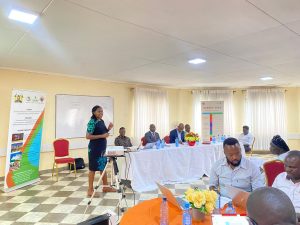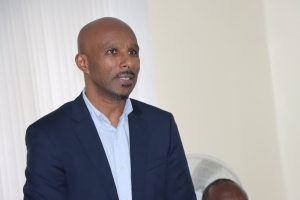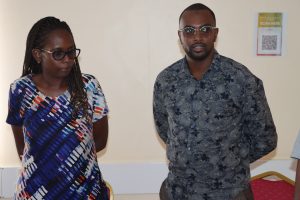The State Department for Technical, Vocational Education and Training, hosted the inaugural half-yearly performance and progress meeting for the Skills Initiative for Africa (SIFA) at the Kisumu National Polytechnic in Kisumu City. This meeting brought together grantees of the SIFA programme in Kenya and key stakeholder including Mr John Tuwei, Director Technical Education representing the Principal Secretary for TVET; Mr. Gemechu Berhanu, Principal Programme Officer, SIFA, AUDA-NEPAD; Dr. Rose Kitur, Director of NEPAD Programme, NEPAD/APRM Kenya Secretariat; Mr. James Wamwangi, Country Coordinator SIFA; Mr. Munene Njeru, Ministry of Education, SIFA Focal Person among others.

Dr. Rose Kitur, Director of NEPAD Programmes giving her remarks during the half-yearly performance and progress meeting for the Skills Initiative for Africa (SIFA)
SIFA is an initiative of the African Union Commission, supported by the German government. This initiative aims at enhancing the occupational prospects of young Africans and is currently in its pilot phase across eight participating countries (Cameroon, Ethiopia, Ghana, Kenya, Nigeria, South Africa, Togo, and Tunisia.) The success of the initiative centers on five pillars: Access – ensuring youth have opportunities; Quality – delivering skills that are directly applicable to the job market; Equity – promoting inclusivity, particularly for marginalized groups; Relevance – aligning education and training with employment opportunities; and Governance – innovating skill delivery and assessment to adapt to dynamic economic needs.
A major highlight of the meeting was the presentations by the grantees funded by AUDA-NEPAD. In Kenya, SIFA has 10 grantees that offer training in critical sectors, including information technology, construction, blue economy, agriculture, and hospitality.
In her speech, delivered by Mr. John Tuwei, Director of Technical Education the Principal Secretary for TVET, Dr. Esther Thaara emphasized Kenya’s unwavering commitment to the objectives of SIFA. She highlighted that, through this initiative, the youth are provided with access to high-quality, inclusive, and relevant training, equipping them for success in both local and global economies.
Dr. Rose Kitur, Director of NEPAD Programmes, emphasized the alignment of SIFA goals with the African Union Agenda 2063. Dr. Kitur underscored the importance of equipping the continent youth with relevant skills to foster Africa economic transformation and development.

Dr. Rose Kitur, Director of NEPAD Programmes
In his remarks, Mr. Gemechu Berhanu, AUDA-NEPAD Principal Program Officer for SIFA noted that SIFA remains a cornerstone in addressing the youth unemployment and mismatch of skills challenge in Kenya and across Africa. The ongoing program underscores the crucial role in equipping young people with the skills needed to thrive in an increasingly competitive global economy, while contributing to the broader economic growth of the continent.

Mr. Gemechu Berhanu, AUDA-NEPAD Principal Program Officer for SIFA
The meeting also highlighted the significant role of partnerships between the Kenyan government, international organizations, and private sector stakeholders in promoting vocational education and training (TVET) across the region.
SIFA targets four core areas of intervention: Equipping institutions with the necessary tools and technology, updating and revising curricula to meet contemporary demands, encouraging skilled youth to pursue self-employment and entrepreneurship, and creating scholarship opportunities to support further education and training. Additionally, SIFA aligns with the Bottom-Up Economic Transformation Agenda, which prioritizes empowering local communities and individuals, especially the youth, by enhancing their skills and creating opportunities for economic participation at the grassroots level. This approach is consistent with Kenya’s vision of fostering inclusive growth by providing training that opens doors to entrepreneurship and self-employment.

Deputy Director, NEPAD Programmes, Ms. Rebecca Arunga, and Programme Officer, Mr. Ali Galgallo
